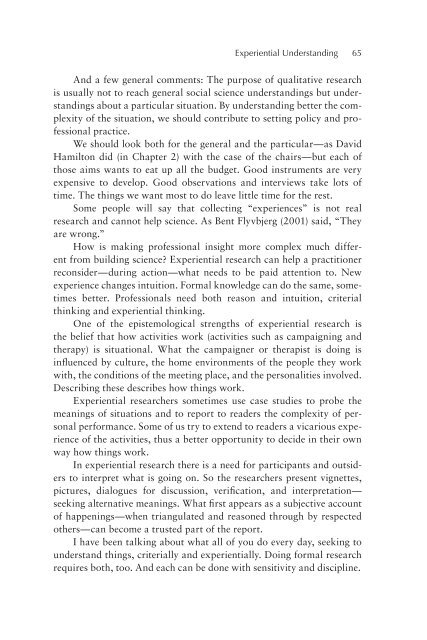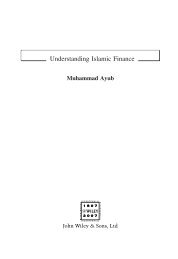How Things Work - Doha Academy of Tertiary Studies
How Things Work - Doha Academy of Tertiary Studies
How Things Work - Doha Academy of Tertiary Studies
Create successful ePaper yourself
Turn your PDF publications into a flip-book with our unique Google optimized e-Paper software.
experiential Understanding 65<br />
And a few general comments: The purpose <strong>of</strong> qualitative research<br />
is usually not to reach general social science understandings but understandings<br />
about a particular situation. By understanding better the complexity<br />
<strong>of</strong> the situation, we should contribute to setting policy and pr<strong>of</strong>essional<br />
practice.<br />
We should look both for the general and the particular—as David<br />
Hamilton did (in Chapter 2) with the case <strong>of</strong> the chairs—but each <strong>of</strong><br />
those aims wants to eat up all the budget. Good instruments are very<br />
expensive to develop. Good observations and interviews take lots <strong>of</strong><br />
time. The things we want most to do leave little time for the rest.<br />
Some people will say that collecting “experiences” is not real<br />
research and cannot help science. As Bent Flyvbjerg (2001) said, “They<br />
are wrong.”<br />
<strong>How</strong> is making pr<strong>of</strong>essional insight more complex much different<br />
from building science? Experiential research can help a practi tioner<br />
reconsider— during action—what needs to be paid attention to. New<br />
experience changes intuition. Formal knowledge can do the same, sometimes<br />
better. Pr<strong>of</strong>essionals need both reason and intuition, criterial<br />
thinking and experiential thinking.<br />
One <strong>of</strong> the epistemological strengths <strong>of</strong> experiential research is<br />
the belief that how activities work (activities such as campaigning and<br />
therapy) is situational. What the campaigner or therapist is doing is<br />
influenced by culture, the home environments <strong>of</strong> the people they work<br />
with, the conditions <strong>of</strong> the meeting place, and the personalities involved.<br />
Describing these describes how things work.<br />
Experiential researchers sometimes use case studies to probe the<br />
meanings <strong>of</strong> situations and to report to readers the complexity <strong>of</strong> personal<br />
performance. Some <strong>of</strong> us try to extend to readers a vicarious experience<br />
<strong>of</strong> the activities, thus a better opportunity to decide in their own<br />
way how things work.<br />
In experiential research there is a need for participants and outsiders<br />
to interpret what is going on. So the researchers present vignettes,<br />
pictures, dialogues for discussion, verification, and interpretation—<br />
seeking alternative meanings. What first appears as a subjective account<br />
<strong>of</strong> happenings—when triangulated and reasoned through by respected<br />
others—can become a trusted part <strong>of</strong> the report.<br />
I have been talking about what all <strong>of</strong> you do every day, seeking to<br />
understand things, criterially and experientially. Doing formal research<br />
requires both, too. And each can be done with sensitivity and discipline.

















